
The Pentatomoidea are a superfamily of insects in the suborder Heteroptera of the order Hemiptera. As hemipterans, they possess a common arrangement of sucking mouthparts. The roughly 7000 species under Pentatomoidea are divided into 21 families. Among these are the stink bugs and shield bugs, jewel bugs, giant shield bugs, and burrower bugs.

Pentatomidae is a family of insects belonging to the order Hemiptera, generally called shield bugs or stink bugs. Pentatomidae is the largest family in the superfamily Pentatomoidea, and contains around 900 genera and over 4700 species. As hemipterans, the pentatomids have piercing sucking mouthparts, and most are phytophagous, including several species which are severe pests on agricultural crops. However, some species, particularly in the subfamily Asopinae, are predatory and may be considered beneficial.

Scutelleridae is a family of true bugs. They are commonly known as jewel bugs or metallic shield bugs due to their often brilliant coloration. With the name based on the Asian genus Scutellera, they are also known as shield-backed bugs due to the enlargement of the thoracic scutellum into a continuous shield over the abdomen and wings. This latter characteristic distinguishes them from most other families within Heteroptera, and may lead to misidentification as a beetle rather than a bug. These insects feed on plant juices from a variety of different species, including some commercial crops. Closely related to stink bugs, they may also produce an offensive odour when disturbed. There are around 450 species worldwide.

Pentatominae is a subfamily of Pentatomidae, a family of shield bugs. This subfamily is the largest one within the Pentatomidae, having 4937 species classified in 938 genera. Species in this subfamily are phytophages and several of them are considered agricultural pests. Some invasive pentatomines such as Halyomorpha halys and Bagrada hilaris have been considered household pests. Higher systematics of the group have been revised by Rider et al.
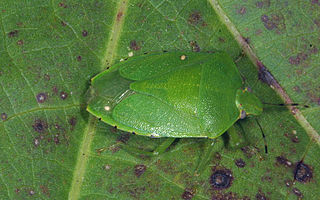
The green stink bug or green soldier bug is a stink bug of the family Pentatomidae.

Picromerus bidens, the spiny shieldbug or spiked shieldbug, is a carnivorous species of shield bug in the family Pentatomidae.
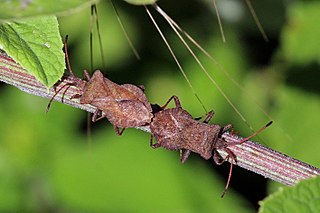
Coreus marginatus is a herbivorous species of true bug in the family Coreidae. It is commonly known as the dock bug as it feeds on the leaves and seeds of docks and sorrels. It is a medium-sized speckled brown insect, between 13 and 15 mm long as an adult, with a broad abdomen. It occurs throughout Europe, Asia and northern Africa. It is often found in dense vegetation, such as hedgerows and wasteland.
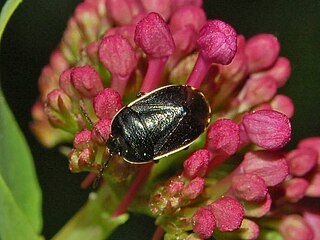
Canthophorus dubius is a species of burrowing bugs or negro bugs belonging to the family Cydnidae, subfamily Sehirinae.

Stagonomus venustissimus, common name woundwort shieldbug, is a species of shieldbug belonging to the family Pentatomidae, subfamily Pentatominae.

Tessaratomidae is a family of true bugs. It contains about 240 species of large bugs divided into 3 subfamilies and 56 genera.

Nezara is a genus of plant-feeding stink bug of the family Pentatomidae, first described by Charles Jean-Baptiste Amyot & Jean Guillaume Audinet-Serville in 1843.

LopodytesRondani 1867 is a genus in the family Reduviidae, the assassin bugs. Members of the genus have been unofficially assigned the common name grass assassin bugs, but generally this name remains meaningful only to naturalists, because these insects have been too well camouflaged to raise robust public awareness.

Podopinae, known as turtle bugs, are a subfamily of the insect family Pentatomidae. The type genus is Podops.

Carpocorini is a tribe of stink bugs in the family Pentatomidae. There are more than 100 genera in Carpocorini.

Cyclopelta siccifolia is a bug in the family Dinidoridae found in South Asia. It is known for its large aggregations on certain species of plants. They have been known to aggregate and damage Erythrina, Sesbania, Pongamia, and Cajanus cajan.
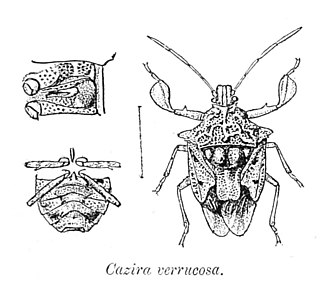
Cazira is a genus of shield bugs found in the Indo-Malayan region.

Stenozygum is a genus of stink bugs in the family Pentatomidae. It is widely distributed in Australian-Melanesian, Oriental, Palearctic and Ethiopian regions.
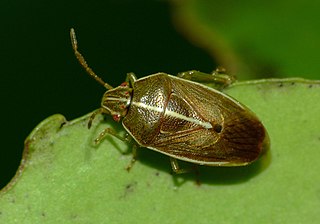
Rhopalimorpha is a genus of insects in the shield bug family Acanthosomatidae. It is native to Australia and New Zealand. There are four species in the genus, of which three are found in New Zealand.
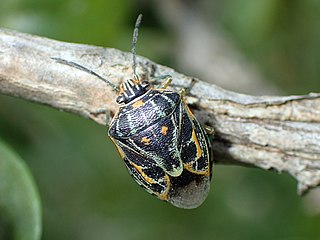
The Antestiini are a tribe of shield-bugs, in the subfamily Pentatominae erected by William Lucas Distant in 1902. Genera are distributed from Africa to South-East Asia and Australia; in West Africa genera such as Antestiopsis are significant coffee pests.























